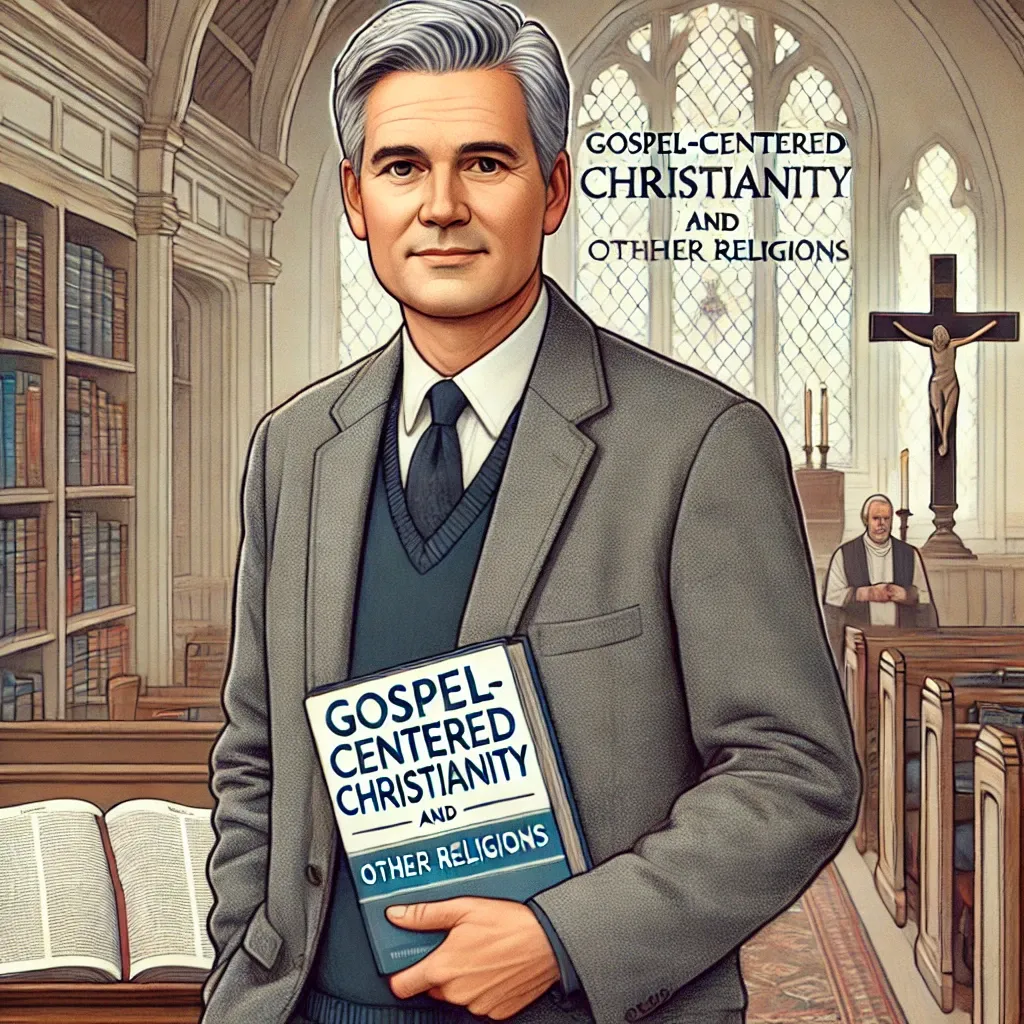

By Dr. Tim Orr
Over the past several days, Julian Bond has posted critical comments on X, formerly known as Twitter, in response to my book. While the volume of his tweets spans a wide range of issues, many of which I believe misrepresent my arguments and the Christian faith, I have chosen to engage only a sample of his critique. My goal is not to respond point-by-point to every post, but to address some underlying assumptions that shape his perspective. To do that well, it’s important to understand who Julian Bond is and how his spiritual journey informs his objections.
Who Is Julian Bond?
Before diving into Julian Bond’s recent critiques of my book on X, I think it’s only fair to give readers a sense of where he’s coming from. Bond isn’t just a random commenter; he brings a unique background and perspective. He spent years serving in leadership roles within the Methodist Church in the UK and, as far as I know, still works for them. But in August 2023, after what he described as a long and thoughtful spiritual journey, Bond publicly embraced Islam.
His story is both unusual and revealing. Bond has been deeply involved in interfaith work for a long time. He was the founding director of the Christian Muslim Forum, where he championed respectful conversations between Christians and Muslims. One of the formats he helped pioneer was called “scripture-sohbets”—spiritual gatherings where people reflected on Bible passages and the Qur’an. Over time, Bond became more engaged in Islamic practice. He began attending Friday prayers regularly, fasted during Ramadan, and explored Islamic spirituality—even while remaining active in church life.
His move toward Islam wasn’t dramatic or reactionary—it was slow and deliberate. In one interview, he described saying the shahada (the Islamic declaration of faith) as a moment that left him feeling “much lighter… as if I’d arrived.” That kind of language speaks volumes. It reflects a posture toward faith that embraces fluidity—a blending of traditions and experiences rather than firm theological commitments. That lens deeply shapes how Bond sees religion and approaches interfaith dialogue.
So when Bond critiques my book, it’s important to recognize that we’re not just working from different conclusions—we’re working from fundamentally different starting points. His approach emphasizes coexistence, shared spirituality, and minimizing sharp theological distinctions. Mine is grounded in the conviction that the gospel is not just one option among many—the good news reveals the truth about God, sin, and salvation.
What follows isn’t meant to dismiss Bond’s experience or sincerity. I’m writing to clarify where and why we disagree, especially regarding the nature of truth, the meaning of faith, and the life-changing power of the gospel.
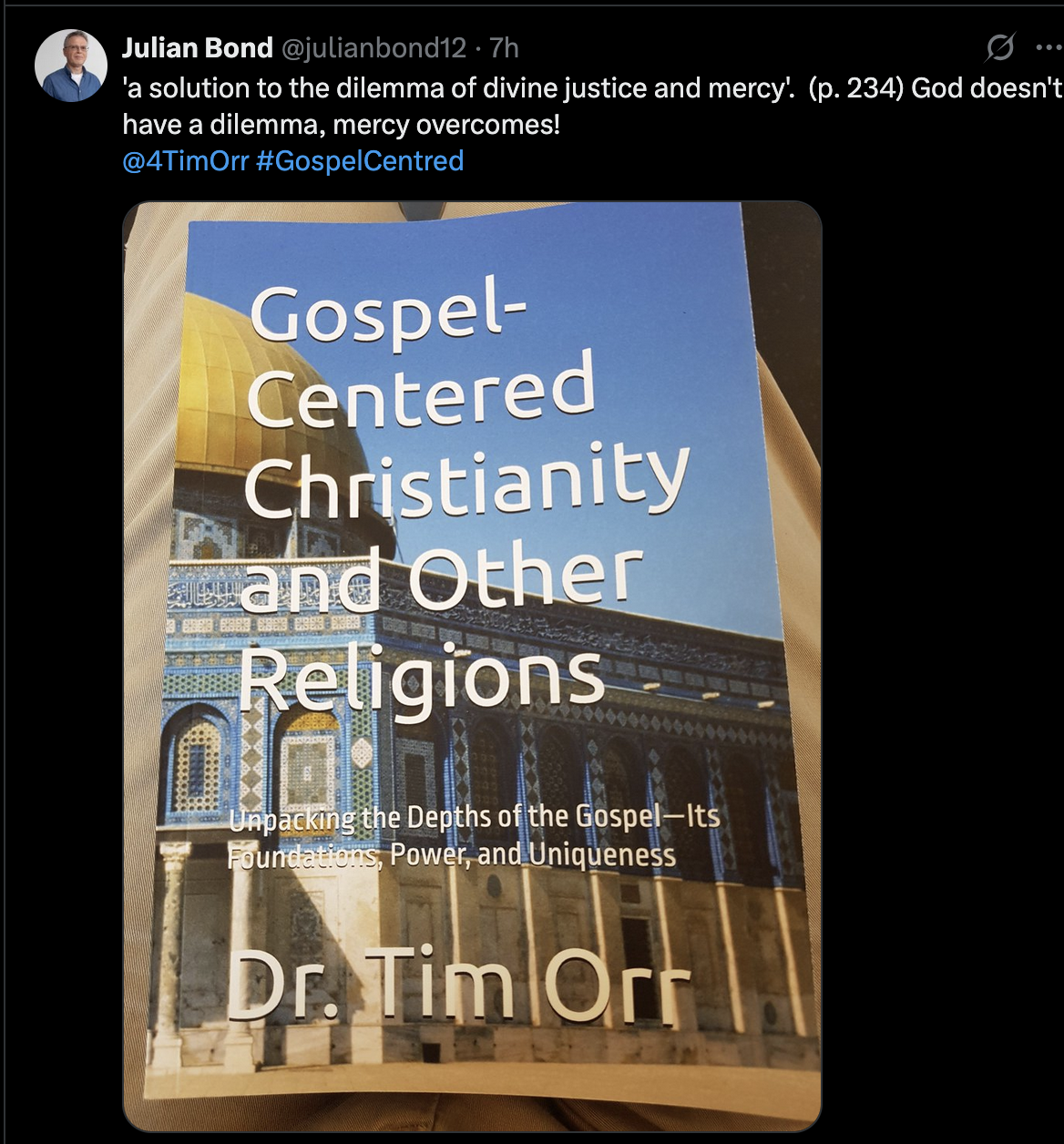
Julian Bond’s tweet—“God doesn’t have a dilemma, mercy overcomes!”—was aimed at my statement that the gospel offers “a solution to the dilemma of divine justice and mercy” (p. 234). But his comment reflects more than just a difference of opinion—it reveals something deeper about the framework he’s operating from. From what I can see, his view is shaped both by Islamic theology and by years of interfaith work that tend to blur the lines between major truth claims. In Islam, God’s mercy is given simply by divine will—“He forgives whom He wills” (Qur’an 39:53)—without cross, sacrifice, or necessary reckoning for sin. But this kind of mercy skips over the weight of human guilt. It treats forgiveness like a divine wave of the hand rather than a costly act of justice.
The gospel tells a very different story. God doesn’t ignore sin—He deals with it head-on. At the cross, Jesus took on the punishment we deserved so that God could remain just while still offering mercy. That’s why Paul says God is both “just and the justifier of the one who has faith in Jesus” (Romans 3:26). This is the beauty of Christianity: mercy flows through justice—it doesn’t cancel it.
I can’t help but think that Bond’s years of working in interfaith circles—where the goal is often mutual affirmation—have led him to swap theological clarity for feel-good spirituality. In trying to elevate mercy, he strips it of its depth. The result is a god who may seem kind on the surface, but who ultimately excuses evil without consequence. And if that’s the case, then this god isn’t truly good—he’s unjust. Only in the gospel do we find a God who is both perfectly just and breathtakingly merciful. That’s the kind of God worth trusting.
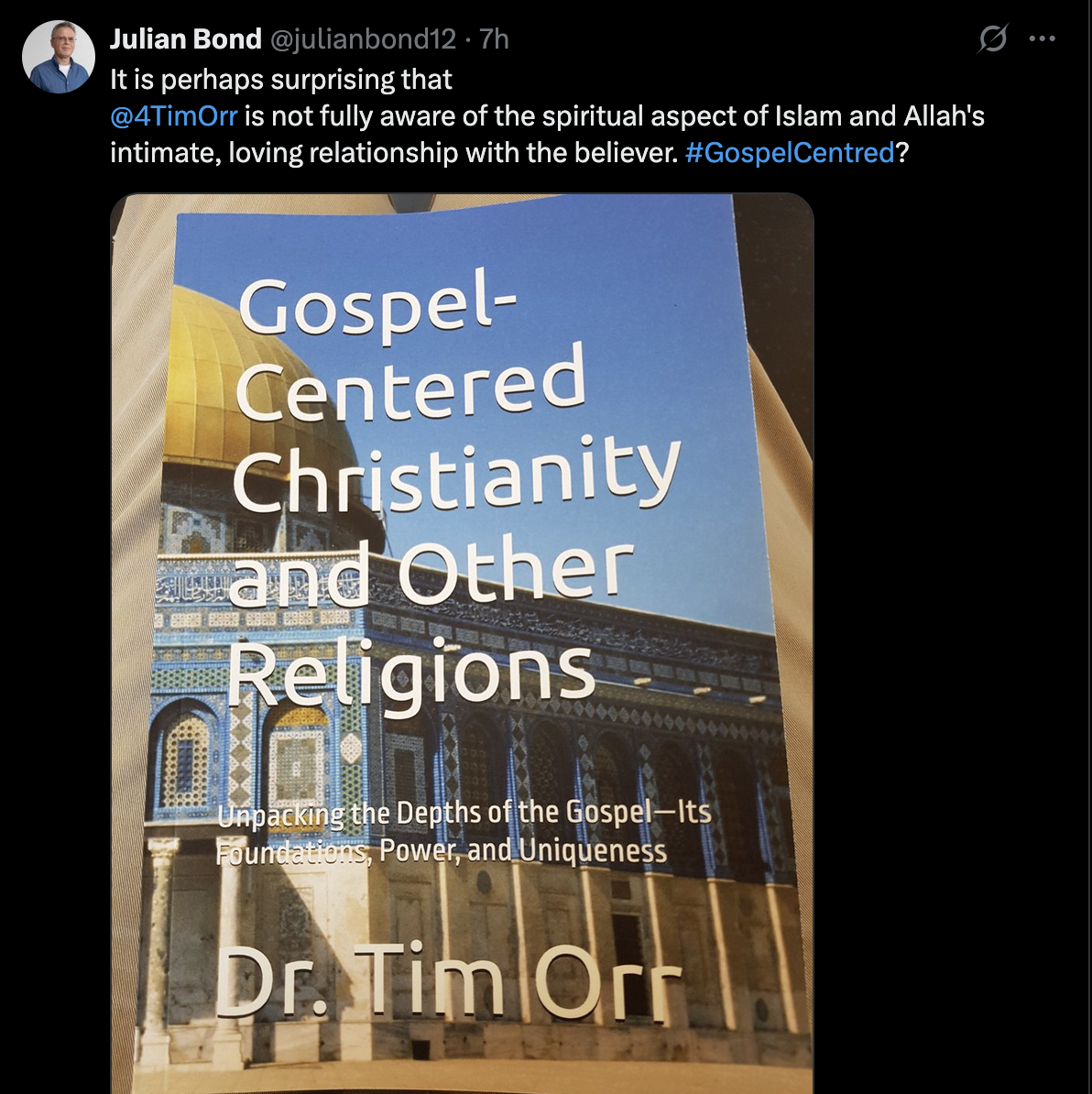
Julian Bond suggests it’s “perhaps surprising” that I’m “not fully aware of the spiritual aspect of Islam and Allah’s intimate, loving relationship with the believer.” But what’s surprising is the theological sleight of hand involved in this claim. The God of Islam is many things—majestic, sovereign, merciful in a general sense—but intimate and loving in the personal, covenantal way revealed in Jesus Christ? That’s not how the Qur’an portrays Him.
In Islam, Allah’s love is conditional, transactional, and restricted. The Qur’an repeatedly emphasizes that “Allah does not love the unbelievers” (Q 3:32) and that He “loves those who purify themselves” (Q 2:222) or “do good” (Q 3:134). Love is not the foundation of the relationship; submission is. There is no Abba-Father language. No adoption into the family of God. No assurance of God’s unchanging affection. Even the most devout Muslim cannot be certain of Allah’s favor on the Day of Judgment.
Contrast that with the Christian gospel: God demonstrates His love “while we were still sinners” (Romans 5:8). Through Christ, we are not just forgiven—we are brought near, adopted, and called His children (Galatians 4:4–7). The intimacy Bond longs to find in Islam is found only in Jesus, who says, “I no longer call you servants… instead, I have called you friends” (John 15:15).
So no, I’m not unaware of Islam’s spiritual claims—I don’t confuse mystical reverence with redemptive relationship. Bond describes love as still bound by distance, conditionality, and uncertainty. The gospel offers something far more: a God who rules and stoops to dwell with us, die for us, and bring us home.
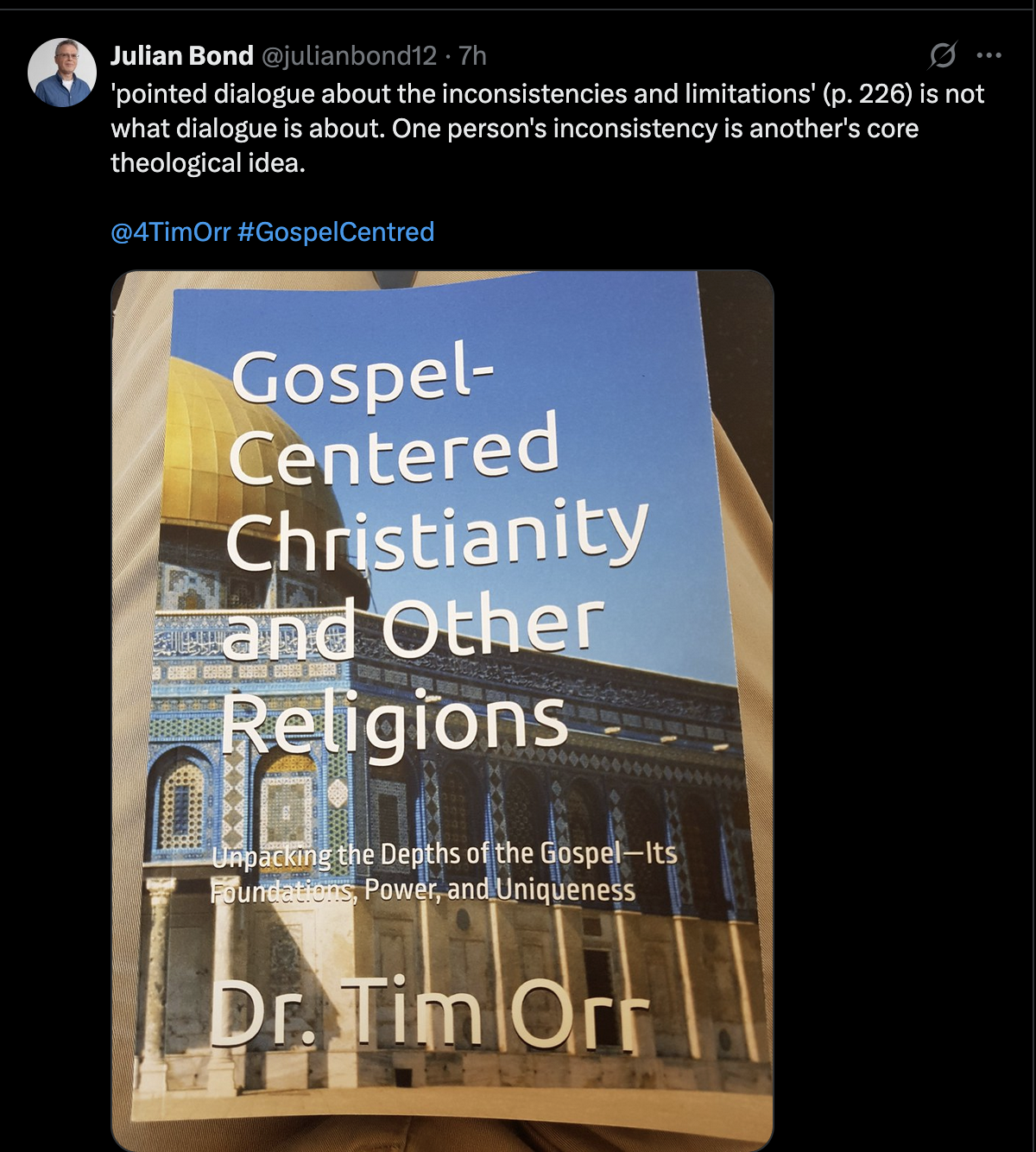
He takes issue with my call for “pointed dialogue about the inconsistencies and limitations” of religious belief (p. 226), claiming that such engagement “is not what dialogue is about.” He adds, “One person’s inconsistency is another’s core theological idea.” But this is exactly the kind of relativism that guts interfaith dialogue of its meaning and turns it into a polite echo chamber. If we can't lovingly but honestly examine inconsistencies, then dialogue becomes little more than mutual flattery.
Let’s be clear: true dialogue is not the avoidance of disagreement but the courageous and respectful pursuit of truth. Bond’s approach suggests that people must be immune to criticism because they hold their beliefs deeply. But that’s not dialogue; that’s diplomacy. It may be good for keeping tempers down at a conference table, but it does nothing to help people grapple with what is true, what is false, and what ultimately gives life.
In reality, the idea that “one person’s inconsistency is another’s theology” undermines the integrity of theology itself. If something is self-contradictory or incoherent, we are not unloving for pointing it out—we are loving enough to say, “There’s a better way.” Christians are called to speak the truth in love (Ephesians 4:15), not to pretend that truth is unknowable or that contradictions can coexist with conviction. Bond’s dialogue model may protect feelings, but it does not sharpen minds or stir hearts toward God. Ironically, what he dismisses as “pointed dialogue” is often the very thing God uses to awaken people to the beauty and coherence of the gospel.
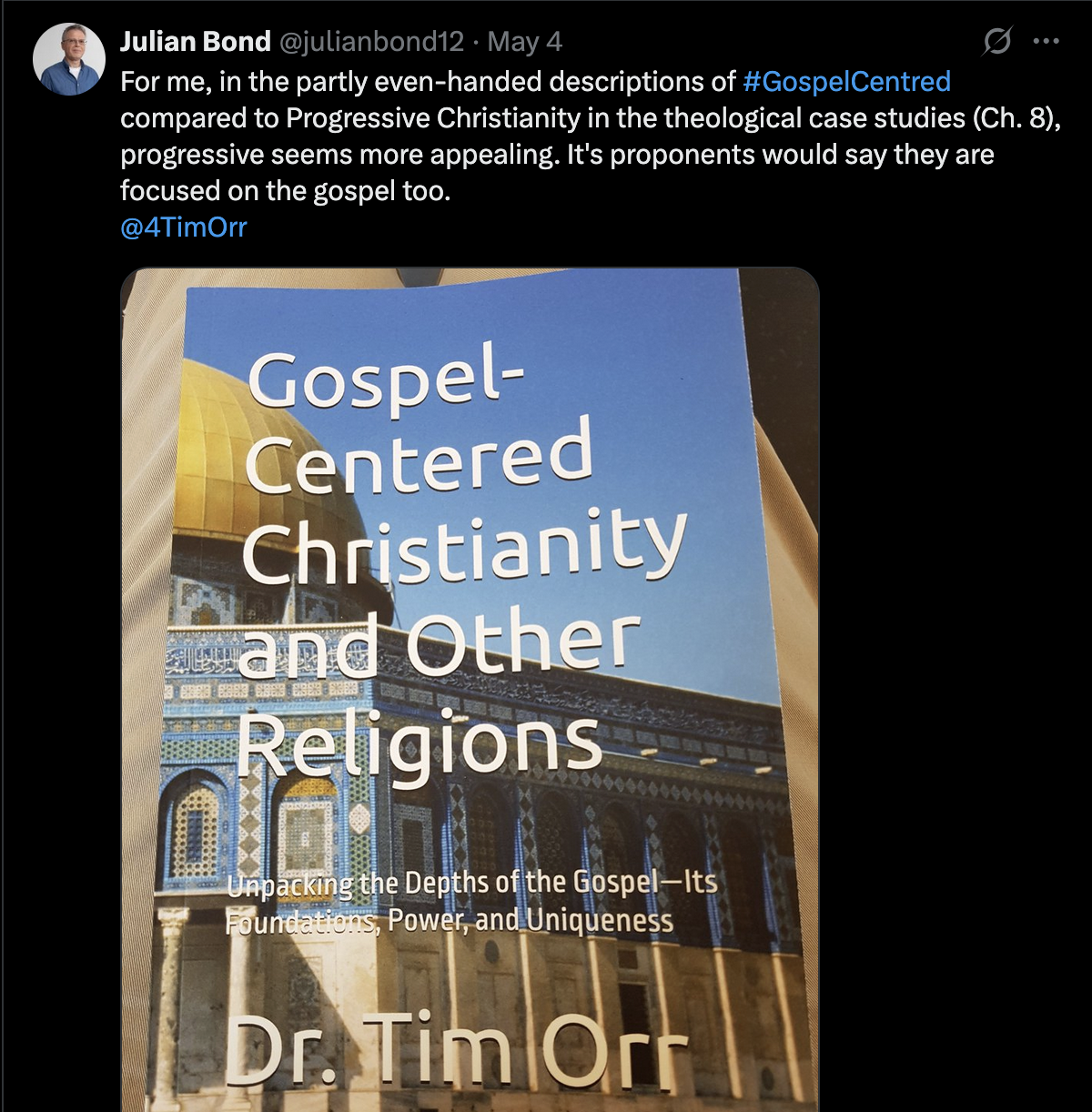
In this tweet, Bond says that Progressive Christianity, as presented in Chapter 8 of my book, “seems more appealing,” and notes that its proponents would also claim to be “focused on the gospel.” This is a revealing statement—not because it’s surprising, but because it underscores the very problem with today’s theological climate: appeal is mistaken for authority, and self-definition is mistaken for faithfulness.
Yes, progressive Christians often talk about the gospel. But so did the Gnostics, the Judaizers, and every heretical movement in church history. The real question is not whether someone uses the word “gospel,” but what they mean by it. The gospel isn’t a vibe, a value system, or a political posture—it’s the historic announcement that Jesus Christ died for our sins, was buried, rose again, and now reigns as Lord (1 Corinthians 15:1–4). Progressive Christianity redefines this good news into something far smaller: a call to inclusion, a celebration of human potential, or a vague ethic of love devoid of the cross's offense. That’s not gospel—it’s a therapeutic counterfeit.
Bond finds Progressive Christianity “more appealing.” I don’t doubt it. A gospel without wrath, repentance, or lordship will always appeal to the natural heart. But the biblical gospel isn't about what appeals to us; it’s about what saves us. Jesus didn’t come to win a popularity contest—He came to die for sinners and rise again to reign. That may not be appealing to the world, but it is the power of God for salvation (Romans 1:16), and that’s the gospel on which everything is worth centering.
Why This Matters
Julian Bond’s string of critiques doesn’t just reveal his disagreement with my book—it exposes a broader theological drift that’s becoming all too common in interfaith and progressive circles. Whether it’s redefining mercy apart from justice, softening the gospel into a feel-good spirituality, or downplaying the importance of truth in dialogue, each of Bond’s comments reflects a worldview that resists the sharp edges of biblical Christianity. But the gospel was never meant to be safe, sentimental, or malleable. It’s a message that confronts our sin, exposes our self-deception, and leads us to the cross, where justice and mercy meet, truth and grace embrace, and real transformation begins.
I don’t respond to Bond out of defensiveness, but out of conviction. The gospel is too precious to be diluted, too powerful to be reduced to personal appeal, and too urgent to be silenced in the name of dialogue. If we care about our Muslim neighbors, progressive friends, or anyone seeking truth, we owe them more than affirmation—we owe them the clarity and compassion of the true gospel. And that means sometimes, we must say the hard things. Not to win an argument, but to witness the only message that saves.
Who is Dr. Tim Orr?
Tim serves full-time with Crescent Project as the assistant director of the internship program and area coordinator, where he is also deeply involved in outreach across the UK. A scholar of Islam, Evangelical minister, conference speaker, and interfaith consultant, Tim brings over 30 years of experience in cross-cultural ministry. He holds six academic degrees, including a Doctor of Ministry from Liberty University and a Master’s in Islamic Studies from the Islamic College in London.
In addition to his ministry work, Tim is a research associate with the Congregations and Polarization Project at the Center for the Study of Religion and American Culture at Indiana University Indianapolis. His research interests include Islamic antisemitism, American Evangelicalism, and Islamic feminism. He has spoken at leading universities and mosques throughout the UK—including Oxford University, Imperial College London, and the University of Tehran—and has published widely in peer-reviewed Islamic academic journals. Tim is also the author of four books.
